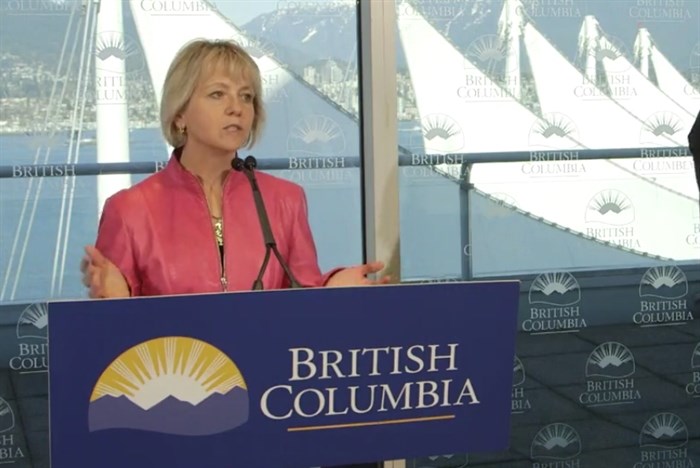
Provincial Health Officer Dr. Bonnie Henry speaking at a press conference March 18, 2020.
Image Credit: FACEBOOK
January 21, 2021 - 7:00 PM
As of today, Jan. 21, it has been one year since Provincial Health Officer Dr. Bonnie Henry and Minister of Health Adrian Dix held their first joint COVID-19 briefing.
That was four days before the first COVID-19 case was recorded in Canada – a man is his 50s who arrived in Toronto from Wuhan, China where the pandemic started.
Two days later, B.C. had its first positive case, also a man, this one in his 40s, who had returned to the Vancouver Coastal health region from Wuhan.
From the hoarding of toilet paper and the shutdown of the economy to the injection of the first COVID vaccines, here's some of the things we lived through over the last very long year of COVID-19.
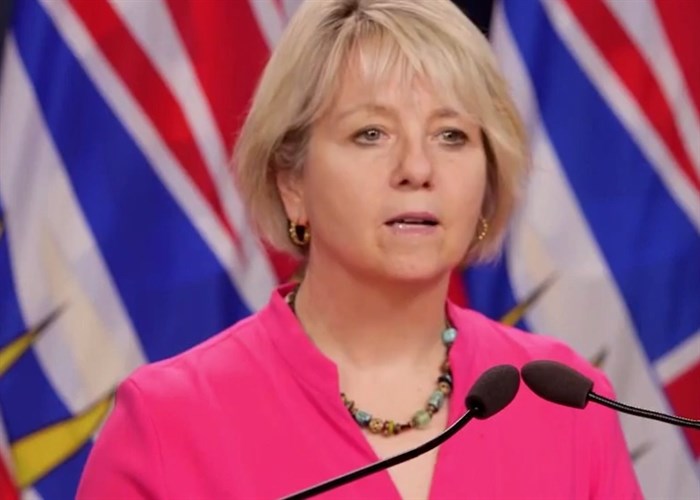
Dr. Bonnie Henry Jan.18, 2021.
Image Credit: FACEBOOK/BC Government
Jan. 25
First case in Canada
Feb. 3
Second case of COVID-19 in B.C.
Feb. 11
The World Health Organization announces COVID-19 as the name for the novel coronavirus disease.
Feb. 14
First COVID-19 case recorded in the Interior Health region.
Feb. 19
B.C. government announces the person with the first case of COVID-19 in the province has fully recovered.
Feb. 26
Federal Health Minister Patty Hajdu encourages Canadians to stockpile food and medication in case they or a loved one falls ill with the novel coronavirus.
March 2
Reports of shoppers loading up with toilet paper.
March 6
Stores across the Interior run out of toilet paper. Walmarts in Penticton, Vernon, Kelowna and Kamloops are completely sold out of face masks and hand sanitizer.
March 7
B.C. Government confirms COVID-19 cases at the Lynn Valley Care Centre in North Vancouver.
March 9
First COVID-19 death in B.C.
March 11
The World Health Organization announces COVID-19 can be characterized as a pandemic. There are 46 cases in B.C.
March 12
B.C. government says all gatherings over 250 people must be cancelled. Anyone returning to Canada must stay away from work or school for 14 days and Canadian government recommends against all non-essential travel outside of Canada. The NHL, WHL and the BCHL suspend their 2019-2020 hockey seasons.
March 14
More reports come in of supermarket shelves stripped bare of basic foods.
March 15
Silver Star Mountain Resort closes. Other resorts in the region follow suit over the following days.
March 16
Spring Break starts. The Government of Canada announces it is barring foreign nationals from all countries except the U.S. from entering Canada. B.C. dentists stop practicing.
March 17
B.C. declares a public health emergency. Dr. Henry uses the new powers and orders all bars and nightclubs closed. Social distancing becomes a thing as Dr. Henry announces people need to stay six feet apart. The cap on gatherings is lowered to 50 people. Province announces schools won't reopen after spring break.
March 18
B.C. declares a state of emergency. It is initially in effect for 14 days. Costco implements buying limits and social distancing rules.
March 19
The new normal starts to be seen as Kelowna's Orchard Park Mall is eerily quiet. There are 12 COVID-19 cases within Interior Health's region.
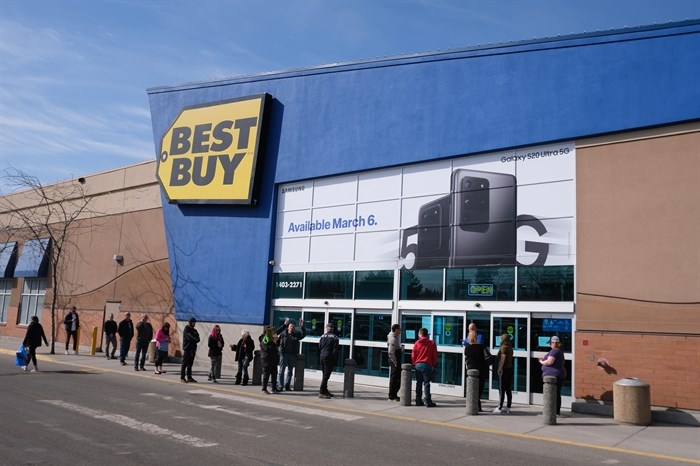
Customers line up outside of Orchard Park Shopping Centre in Kelowna after the province placed a limit on the number of people who could enter stores. Best Buy was one of the few stores in the mall to remain open during the spring lockdown.
(CARLI BERRY / iNFOnews.ca)
March 20
The City of Kamloops declares a local state of emergency. Dr. Henry orders the closure of all restaurants in the province. The Regional District of Central Okanagan shuts down playgrounds.
March 21
Dr. Henry orders all spas, salons and tattoo shops to close. Air Canada suspends flights which service the Kelowna and Kamloops Airports.
March 22
Some Interior supermarkets announce a $2 an hour pay increase for store employees.
March 23
B.C. Premier John Horgan announces one-off $1,000 payment for anybody unable to work due to COVID-19. The premier freezes B.C. student loan repayments until September and initiates deferrals for hydro and ICBC payments. Videos emerge of Vancouver residents on their balconies applauding hospital workers.
March 25
The Federal Government announces the Canada Emergency Response Benefit that will provide $2,000 a month for up to four months for workers who lose their incomes as a result of COVID-19. A repayment freeze on Canada Student Loans is put in place. A $500 rent subsidy is announced in B.C. There are 88 new cases reported in the last 24 hours, the highest number reported so far.
March 27
The Federal Government announces a 75 per cent wage subsidy to support small businesses. Food delivery services report massive uptick in business.
March 28
Provinces compile lists of essential services. Liquor and Cannabis stores, along with dry cleaners, make the B.C. list. A COVID-19 outbreak is declared at Bylands Nursery in West Kelowna after 14 temporary foreign workers test positive. As many as 63 workers were isolated until May 15.
March 29
Kelowna doctor reports 'critical shortage' of masks and PPE for healthcare workers.
March 31
The Canadian Federation of Independent Business reports 32 per cent of small businesses across the country have closed. B.C. health care facilities collect and sterilize disposable masks in an attempt to have an emergency supply if needed. The number of COVID-19 cases in B.C. tops 1,000.
March 31
The Interior Health region passes the 100 mark in COVID-19 cases.
April 1
B.C. visits to emergency rooms down 50 per cent.
April 4
Dr. Henry says B.C. “seeming to flatten our curve." There are 1,203 cases recorded in the province. The number of cases worldwide surpasses one million with more than 57,000 deaths.
April 7
No new COVID-19 cases reported in the province in 72 hours.
April 12
B.C. reports hunting licence sales have nearly doubled.
April 15
B.C. extends state of emergency for another two weeks. There have been 75 COVID-19 related deaths.
April 15
Interior Health region records its first COVID-19 death, a man in his 60s.
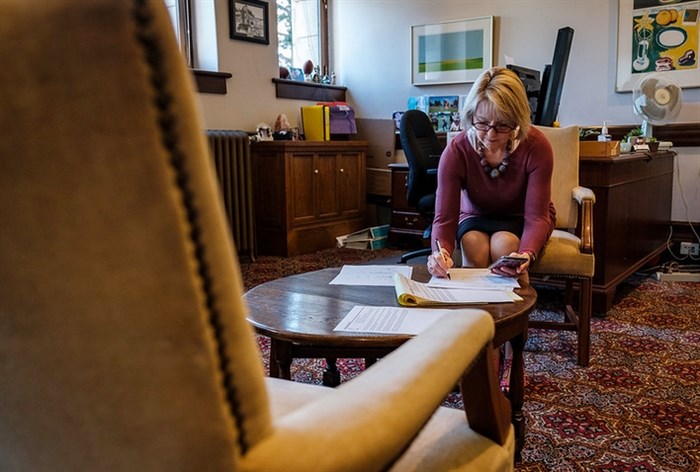
Dr. Bonnie Henry on April 18, 2020.
Image Credit: Flickr/Province of B.C.
April 24
Two hundred pairs of a special $399 Dr. Bonnie Henry shoe designed by John Fluevog sell out as soon as they go on sale. Proceeds go to Food Banks B.C.
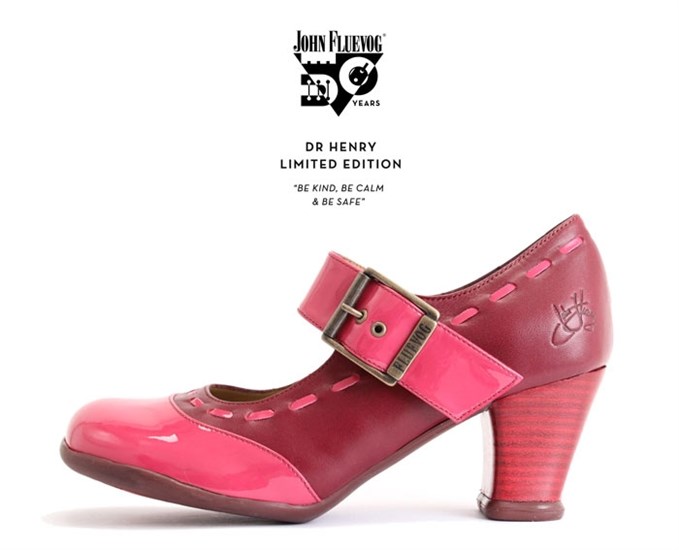
The Dr. Bonnie Henry shoe was a hit.
Image Credit: SUBMITTED/John Fluevog
May 6
B.C. starts lifting COVID-19 restrictions on surgeries, parks, stores and haircuts.
June 1
School children return to school using a hybrid model for learning that combines in-class and remote learning.
June 24
Premier John Horgan announces that Phase 3 of B.C.’s reopening can start, meaning people are encouraged to travel within B.C. Hotels, movie theatres, parks and the film industry gradually re-opening. At that time, B.C. had recorded fewer than 3,000 cases.
July 1
Kelowna's Bernard Avenue is closed to traffic so restaurants can expand their patios onto the street.
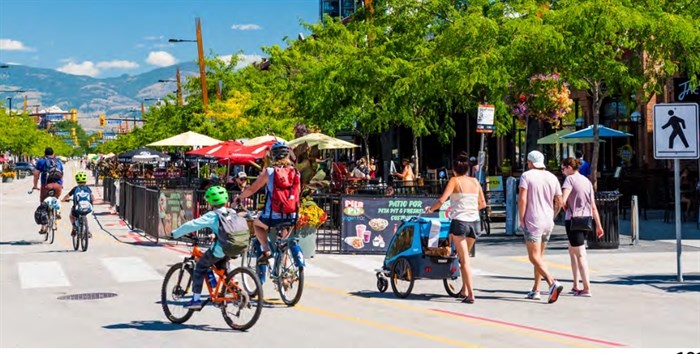
Pedestrian traffic was up 99 per cent on Bernard Avenue after it was closed to vehicles last summer.
Image Credit: Submitted/City of Kelowna
July 13
After going five weeks with no more than one new COVID-19 case per day in the Interior Health region, new cases start to climb as the result of parties held in Kelowna around the July 1 holiday. That becomes known as the Kelowna Cluster and leads to at least 130 positive tests with hundreds more people going into self-isolation.
July 27
The Kelowna Cluster leads to Dr. Henry ordering a clampdown on the number of people who can be in rental accommodation and each unit is allowed only five visitors.
July 30
A UBCO students puts a magnetic notice board on his truck explaining why he has Washington licence plates following hostile reactions to out of province visitors.
Aug. 7
A woman has her Alberta licence plates stolen while stopping overnight in Kamloops.
Aug. 24
B.C. case total passes the 5,000 mark.
Sept. 8
Nightclubs and banquet halls ordered closed.
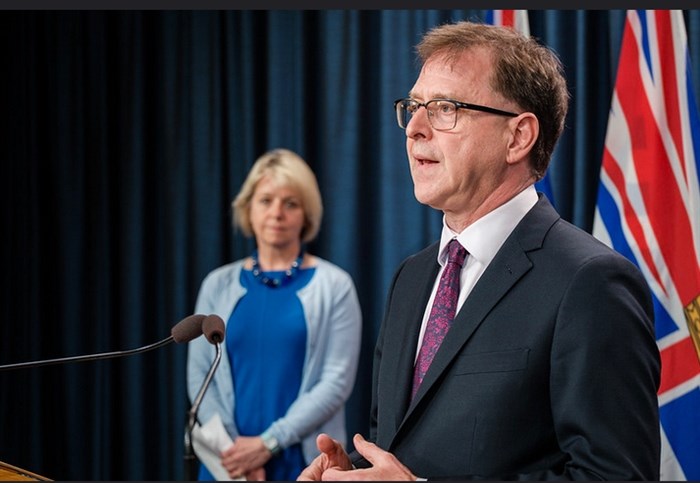
Adrian Dix and Dr. Bonnie Henry, Sept. 10 2020
Image Credit: Flickr/Province of B.C.
Sept. 25
Outbreak at Calvary Chapel in Kelowna leads to seven cases.
Oct. 8
B.C. passes 10,000 COVID-19 cases.
Oct. 21
COVID-19 outbreak at École de l'Anse-au-sable elementary school in Kelowna forces the school to close for two weeks. That's followed by numerous "exposure" events in Interior schools, mostly in the Central Okanagan.
Oct. 22
B.C. sets a new record for the number of COVID-19 cases in a single day at 242. That record is broken repeatedly throughout the fall, peaking at 911 on Nov. 27.
Oct. 26
Visits to homes limited to six guests. Playdates for children are discouraged and wearing masks in public places is expected.
Nov. 7
Dr. Henry orders stricter socializing restrictions in the Lower Mainland. They ban indoor and outdoor social gatherings of any sort except with immediate household members and wearing face masks is mandatory in public spaces. She recommends all non-essential travel stop.
Nov. 13
The Interior Health region records its 1,000th case.
Nov. 19
The Lower Mainland restrictions are extended to the rest of B.C.
Nov. 26
A community cluster is declared in Revelstoke after 22 people tested positive for COVID-19. It was declared contained on Dec. 11 with a total of 50 cases.
Nov. 30
First resident of an Interior Health region long term care home diagnosed with COVID-19. It’s the first of many outbreaks in the region.
Dec. 2
Dr. Henry reports that a B.C. men’s hockey team travelled to Alberta and brought COVID-19 back with them.
Dec. 3
Dr. Henry bans adult team sports games.
Dec. 7
Lock down on socializing in B.C. extended for another month.
Dec. 8
B.C. announces a one-time, tax-free $1,000 per family B.C. Recovery Benefit.
Dec. 13
The organizer of a Kelowna protest against COVID-19 restrictions is fined $2,300 in Kelowna. More fines to come.
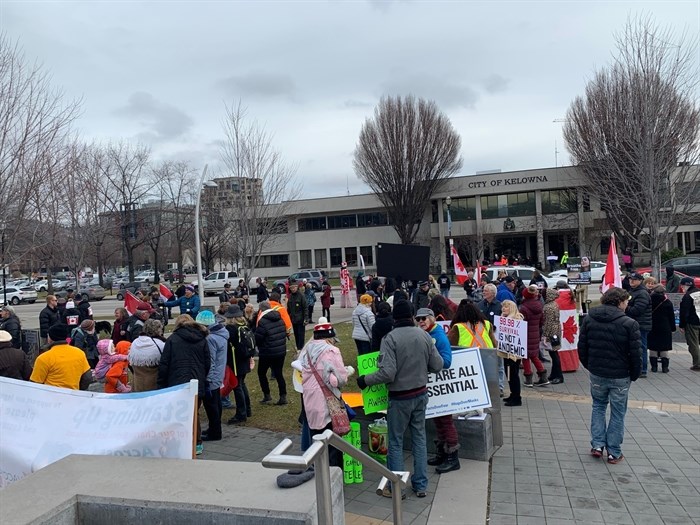
Rallies protesting COVID-19 restriction are held every Saturday in downtown Kelowna. The organizer has received two $2,300 fines.
(CARLI BERRY / iNFOnews.ca)
Dec. 14
Two employees at Big White Ski Resort test positive for COVID-19. That cluster grows to 203 by Jan. 19, 2021. Most are people who work and live on the mountain. Big White cancels reservations for out of region visitors.
Dec. 20
B.C.’s socializing restrictions over Christmas are some of the toughest in Canada.
Dec. 22
First COVID-19 vaccinations administered in Kamloops and Kelowna.
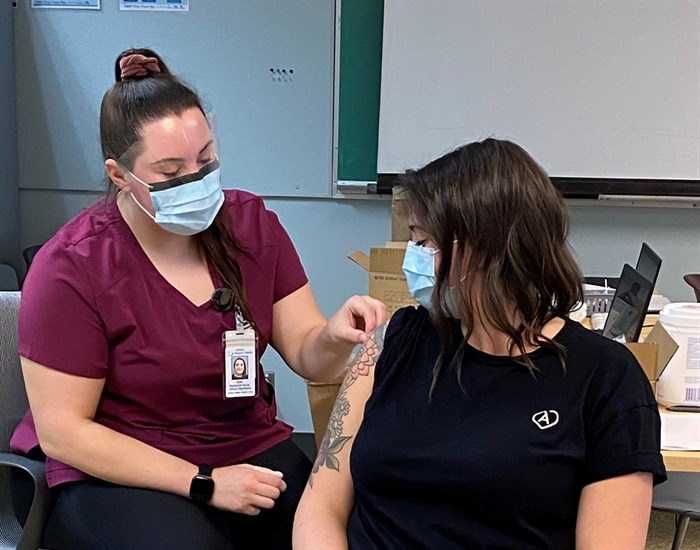
Kelsey Medhurst was the first COVID-19 vaccine recipient in Kamloops.
Image Credit: SUBMITTED/Interior Health
Dec. 23
Dr. Henry says B.C. is bending its COVID-19 curve
Dec. 27
First COVID-19 U.K. variant case found in B.C. Four cases of COVID-19 are reported amongst staff at Sun Peaks Ski Resort.
Dec. 28
B.C. has now recorded more than 50,000 cases.
Dec. 30
Dr. Henry bans liquor sales after 8 p.m. New Year's Eve until 9 a.m. New Year’s Day. That includes bars, restaurants and liquor stores.
Jan. 7
COVID-19 restrictions on social contact extended to Feb. 5.
Jan. 11
Death toll at long term care homes in the Interior Health regions reaches 40.
Jan. 15
Interior Health passes the 5,000 mark in terms of total COVID-19 cases.
Jan. 18
Kelowna’s Harvest Ministries International church hit with its second $2,300 fine for holding in-person services. The church vows to take the province to court over its ban on religious gatherings.
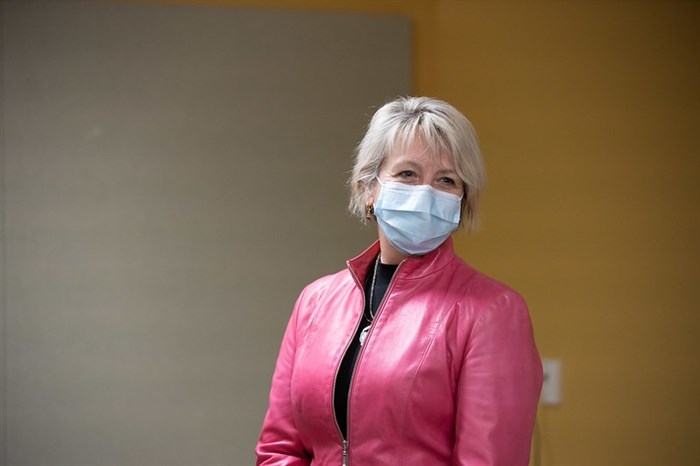
Dr. Bonnie Henry on Dec. 15, 2020.
Image Credit: SUBMITTED / Province of B.C.
Jan. 18
The COVID-19 outbreak at the McKinney Place long term care home in Oliver is declared over. It has been the worst in the Interior with 78 people, including 55 residents, infected and 17 people dying.
Jan. 20
B.C. has recorded 62,412 cases of COVID-19 and 1,104 deaths. In the Interior Health region, there have been 5,465 cases and 55 deaths.
To contact a reporter for this story, email Rob Munro or call 250-808-0143 or email the editor. You can also submit photos, videos or news tips to the newsroom and be entered to win a monthly prize draw.
We welcome your comments and opinions on our stories but play nice. We won't censor or delete comments unless they contain off-topic statements or links, unnecessary vulgarity, false facts, spam or obviously fake profiles. If you have any concerns about what you see in comments, email the editor in the link above.
News from © iNFOnews, 2021